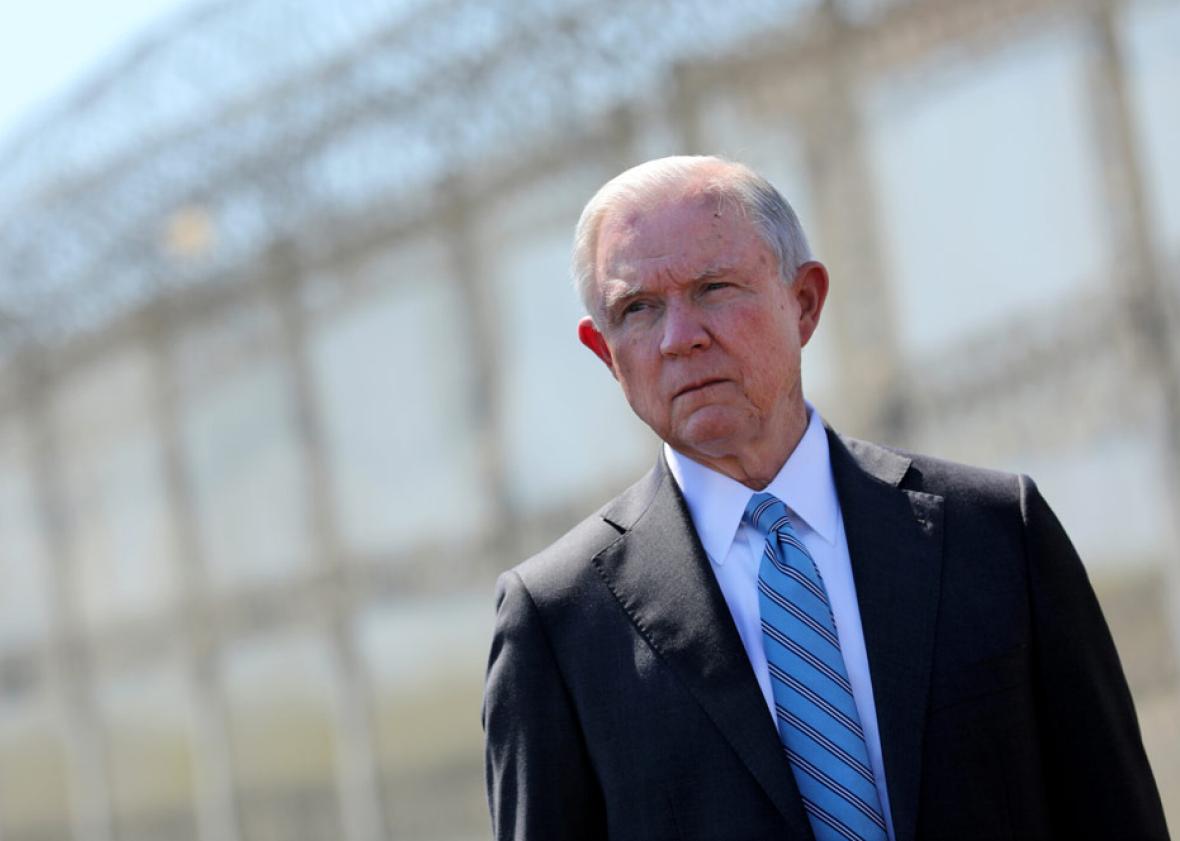Until Tuesday, Jeff Sessions was James Comey’s boss. Based on news reports and the White House’s own timeline, the attorney general played a role in the FBI director’s firing. On Monday, Sessions and his deputy Rod Rosenstein discussed Comey’s termination with Trump in the Oval Office. The next day, Sessions wrote a letter to Trump recommending Comey be removed from his position.
At this stage, that’s all we know about Sessions’ involvement in the ouster of one of his most important employees. And that’s strange.
The FBI is a component of the Department of Justice, which Sessions leads. But beyond his short letter to Trump—in which Sessions positioned himself as a mere rubber stamp for Rosenstein, who had sent him a memo suggesting Comey should be fired for his handling of the Clinton email investigation—the attorney general has not provided any public explanation for the recommendation he made to the president. According to Justice Department spokeswoman Sarah Flores, he has no intentions of doing so. Asked in an email on Wednesday morning whether Sessions plans to address the Comey affair, Flores responded, “Nope.”
The move to get rid of Comey was, of course, Trump’s decision. According to media accounts, it was rooted in Trump’s frustration over Comey’s handling of the Russia probe, his perceived reluctance to pursue leakers, and a more general personal hostility. (The Times reported that Trump thought there was “something wrong with” Comey, and was “particularly irked when Mr. Comey said [during Senate testimony] he was ‘mildly nauseous’ to think that his handling of the email case had influenced the election, which Mr. Trump took to demean his own role in history.”)
That’s the truth. By contrast, the official White House account has been—with some important variations here and there—that Trump’s decision to fire Comey was precipitated by his conversation with Sessions and Rosenstein, as well as the letter he received from Sessions the following day. What did that letter say? To paraphrase: “Check out this great memo I got from Rosenstein.” To actually quote from it: “Based on my evaluation, and for the reasons expressed by the Deputy Attorney General in the attached memorandum, I have concluded that a fresh start is needed at the leadership of the FBI.”
What went into Sessions’ “evaluation”? We have no idea. We do know that at least one of the “reasons expressed by the Deputy Attorney General”—that Comey erred when he announced, 11 days before the election, that the FBI was reopening its probe into Clinton’s emails—is at odds with comments Sessions has made in the past. As Reason’s Jacob Sullum points out, Sessions said last October that Comey—after testifying before Congress about his decision to close the Clinton investigation in July—“had an absolute duty, in my opinion, 11 days or not, to come forward with the new information that he has and let the American people know that.”
Given how unequivocal that statement is, Sessions should feel obligated to offer some insight into why his thinking has changed. How did Comey’s conduct go from fulfilling his “absolute duty” to being an offense worthy of defenestration? We don’t know, because the attorney general is declining to talk about it.
There is one persuasive explanation for Sessions’ silence: He knows what this firing was really about, and he knows the reasons laid out in the Rosenstein memo were mere pretext. Maybe Sessions remembers the pledge he made on March 2, after it came out that he’d lied at his confirmation hearing about never having contacts with Russian officials during the campaign, to stay out of any investigation into possible collusion between Russia and members of the Trump team. If Sessions is staying quiet because he knows he lacks the credibility to defend Comey’s removal, that would make sense. But to admit this would require him to acknowledge the Trump administration’s real motives. And that’s not something that Sessions, the president, or anyone else in Trump’s vicinity seems prepared to do.
